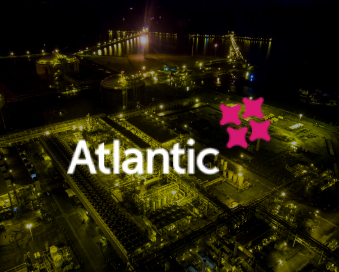Even though the United Nations Climate Change Conference has been postponed to November 2021, work is still underway in Trinidad and Tobago to meet targets in the country’s Nationally Determined Contribution (NDC) under the Paris Agreement.
This was reported by Kishan Kumarsingh, Head of the Multilateral Environmental Agreements Unit in the Ministry of Planning, in a recent virtual lecture to employees of LNG production company Atlantic. The lecture explored Trinidad and Tobago’s key obligations under the Paris Agreement and the nation’s policy framework for climate change, and formed part of Atlantic’s ongoing initiatives to promote environmental awareness.
Andrew Wharton, Atlantic’s Vice President of Health, Safety, Security and the Environment (HSSE), explained that Atlantic’s broader objective was to help promote sound environmental practices as a key component of building a sustainable future for the country.
“Mr. Kumarsingh’s lecture helped to sensitize Atlantic’s employees to the wider national commitment to the global community in terms of international multilateral agreements geared towards the fight against climate change,” Wharton said. “The lecture helped to highlight that everyone has a role and every effort counts.”
Kumarsingh reminded the Atlantic employees of Trinidad and Tobago’s NDC under the Paris Agreement and outlined some of the support activities now in train as part of the NDC implementation plan. The NDC aims to accomplish by 2030 a 15% reduction in overall cumulative emissions from the local power generation, transport and industrial sectors, equivalent to 103 Million Tonnes of carbon dioxide equivalent (MTCO2e), relative to a business-as-usual baseline trajectory. As part of that target, the NDC focuses on achieving by 2030 an unconditional component (meaning not dependent on international financing) of a reduction in public transportation emissions by 30% or 1.7 MTCO2e. This component will be largely implemented through the State-funded compressed natural gas (CNG) fuel-switching initiative.
“The total estimated cost is 2 billion US dollars which is expected to be met partly through domestic funding and also on international climate finance such as the Green Climate Fund,” Kumarsingh said.
Kumarsingh explained that emissions mitigation plans have been developed for the three emitting sectors and that work on an NDC financial investment plan to fund the related initiatives was also in progress.
“Some of the sectoral plans to reduce emissions have already started,” Kumarsingh said. “10% renewable energy by 2021, for example, is already underway.” He added that while the strategy to support a CNG conversion fleet for public and private transportation had already begun, an even more visionary approach was now being explored. “We hope move towards sustainable transport, through electric vehicles charged by renewable energy, so it will be absolutely emissions-free transport, as CNG is transitionary and is still a fossil fuel.”
He also disclosed that energy conservation and energy efficiency initiatives had been identified for the industrial sectors.
As part of its commitment to sustainability and to help build a sustainable future for Trinidad and Tobago, LNG production company Atlantic aims to build environmental awareness among primary school children and its employees, service providers, and home community Point Fortin. Every year, employees and their families and service providers are encouraged to participate in the company’s recycling programme, which in 2019 collected a total of 18 tonnes of cardboard, plastic, paper, glass, and cans.



